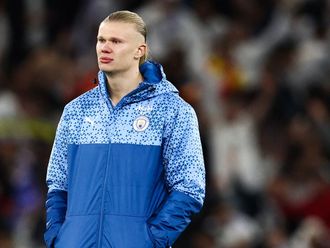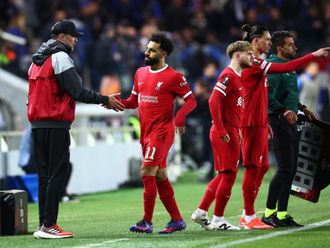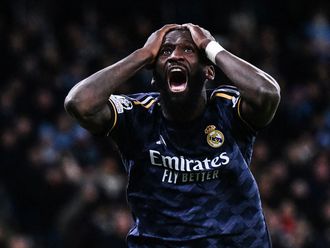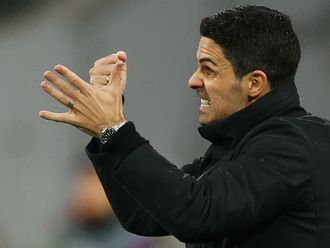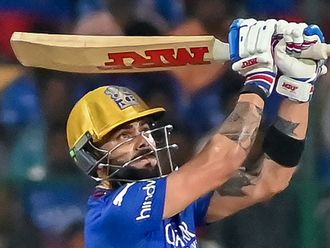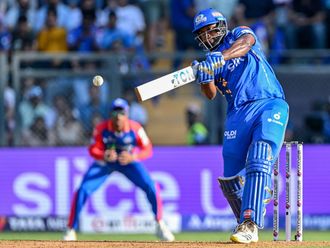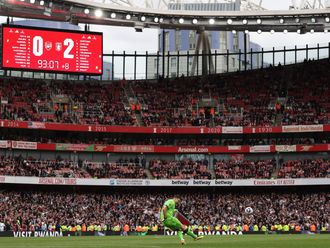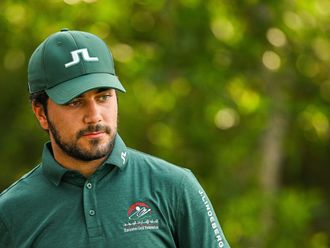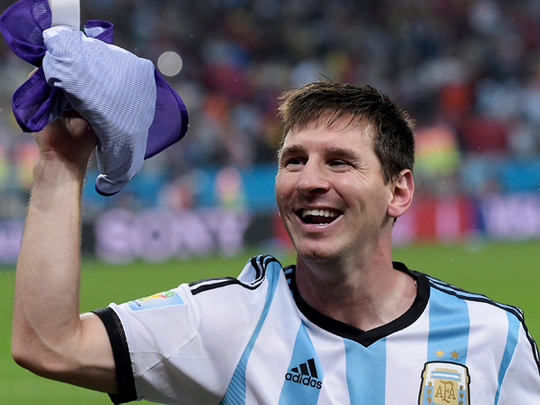
Dubai: So, exit stage left, Brazil’s bedraggled bunch of wannabes, destroyed 7-1 in the World Cup semi-final by a performance of panache and dash by Germany’s slick and well-drilled entertainers.
Enter stage right, Argentina’s Lionel Messi, the protagonist in a tantalising subplot to the thrilling piece of sporting theatre, the last act of which on Sunday features Messi’s South American artistes and artisans sharing the limelight with a German juggernaut.
All eyes will be transfixed on the diminutive genius as he bids to deliver the equivalent of an Oscar-winning performance and add the crowning glory to his illustrious career.
If he succeeds on the biggest stage of all, it is widely accepted that he would cement his legacy as the greatest footballer of all time and end a frenzied debate which has raged for the last few years.
For many people, the most venerated player of the modern age is already the finest-ever exponent of the Beautiful Game due to his consistent brilliance over the last 10 years.
He has inspired his club side FC Barcelona to countless titles through his goals galore — aged just 27, he is already the most prolific goalscorer in the team’s history with 381 goals in 466 appearances — and bewitching skill.
In his 92 internationals, he has scored 42 times and made 25 goals, impressive figures which mean widespread criticism that he does not replicate the same coruscating club form for his country is not wholly justified.
Yet some people believe his compatriot Diego Maradona, the architect of 1986 World Cup success for Argentina through his five goals and inspirational displays, deserves to be considered ahead of Messi in the pantheon of greats.
Another member of this exclusive club, Pele, has persistently opined that Messi’s lack of a World Cup title means he is merely very good and not great.
On top of this, this is regarded as possibly Messi’s last chance to fulfil his destiny and claim the only major piece of silverware eluding him given that he will be 31 at the next World Cup finals.
Spanish football expert Guillem Balague, the author of a 2013 biography about the Argentina talisman titled ‘Messi’, accepts such sentiments — but insists Messi’s claims to being called the best of all time are already unimpeachable.
In an exclusive interview with Gulf News ahead of Argentina’s bid to win their first World Cup since 1986 tonight, he said: “In the eyes of many, yes he has to win the World Cup to be called the greatest. But it is so fickle what we call legend in a way. It is clear that Maradona belongs to that group, but it is also clear in my eyes that Messi at 27 has done more than Maradona in terms of his influence on big games and influence in club titles.
“Of course, you look back at 1986 and see that Maradona was important. But he certainly wasn’t a 90-minute man. “Someone who was in the Argentina camp in 1986 told me said it was only 10 minutes of Maradona [brilliance in games], although those 10 minutes were very important. We have seen something similar in this World Cup, where Messi appears at the right time in a counter-attack for a teammate. And he’s got to do much more than be the forward.
“But I am pretty sure that if he wins the World Cup, a lot of people will stop that debate and in my eyes he already is the greatest.”
Expanding on why he believes Messi is superior to his fellow countryman, Balague added: “It’s due to the consistency of his performances. In two years now he’s played in teams [at Barcelona] that don’t create spaces and don’t play to his strengths. We saw the amount of crosses that [wing-back] Dani Alves put into the box at Barcelona last season and how [midfielder] Xavi Hernandez got too far away from Messi. Also how the team didn’t pressure high, which meant that they couldn’t utilise the pace he’s got.
“But his consistency up to this age now, 27, is much bigger than Maradona or anybody else in the world.”
While he has still fashioned a compelling case to be named the best player at Brazil 2014 due to his four goals and crucial assists, many fans feel Messi has not delivered a Maradona-esque, career-defining vignette (El Diego’s second goal against England in Argentina’s 2-1 quarter-final win in 1986 being a luminous example) to thrust him to peerless status.
Some commentators have also questioned whether he is protecting his hamstring, which he has injured several times in the last couple of years, and therefore is wary of embarking on one of his trademark mesmerising dribbles.
But Balague rejected such theories, suggesting instead that Argentina’s tactics have hampered him from unleashing the full gamut of his voluminous talents.
“Their set-up has been defensive,” he said. “The team’s parted into two, with three or sometimes four forwards and the rest [in] defence. There was a crucial moment after [coach Alejandro] Sabella played five defenders against Bosnia and Herzegovina when the team pushed for a 4-3-3 formation, with Kun [Sergio Aguero], [Gonzalo] Higuain and Messi up front.
“That’s Messi’s favourite position because he knows Kun Aguero and Higuain can work hard and open up spaces to find themselves in positions to receive his passes but, at the same time, he can take advantage of the work being done by them. But by doing that, you have three number nines up front and they don’t defend and the whole team has to defend too deep.
“Sabella has been trying to balance that out by adding a midfielder each time a player gets injured. When [Angel] Di Maria got injured before, when Kun Aguero got injured, he just put midfielders in, which is to get the team to what he wants which is a counter-attacking team, a team where Messi becomes almost like a midfielder.
“But at the moment you cannot have him as a forward, can’t have him around the box. The full backs don’t push forward, the midfielders aren’t very dynamic and spaces are not created. “We have just got to hope he does find some space to do something special in the final as he did in scoring against Iran or assisting as he did with Di Maria [in the 1-0 win over Switzerland]. He’s not protecting himself, no, it’s just the system making him less of a player in a way.”
Messi has also impressed with his captaincy of Argentina, Balague believes, despite not being a natural leader capable of inspiring with Churchillian-esque speeches.
“At the end of the 90 minutes against Holland [in the semi-final], they [the Argentina players] all got into a circle and I think you saw the hierarchy of the group. Sabella spoke, then [midfielder Javier] Mascherano spoke, then Messi spoke. Messi just said: ‘I think we can win this, I see we are strong, let’s continue working’. It was nothing more important than that. But he leads by example.
“He’s involved with things like when tickets need to be given to the family and the free days, the things that captains have to be involved in. But generally it’s with his performances how he leads the group, that matter.”
Despite being Argentina’s favourite footballing son, Balague concedes doubts remain in Messi’s homeland about his credentials as a true Argentine, and that he does not inspire the same levels of evangelical devotion as Maradona.
He says this is due to Messi’s decision to leave Argentina as a young boy to ply his trade at Barcelona and the fact that he is not a drumbeating jingoist and larger-than-life character like his predecessor.
Such criticism continued to upset Messi, leading to him considering whether to quit the national team in 2011.
But Balague insists Messi is fervently patriotic and is fuelled by a mission to deliver World Cup success for a nation of success-starved football followers, who must rely on memories of the halcyon days of Maradona and co for succour.
He said: “He’s very Argentinian, as you’ve seen him singing songs at the end of games. He does sing songs in the changing room as well. Even on his Facebook page he signs himself as ‘Lio’, which is the Argentinian way of saying ‘Leo’, which we say in Barcelona. He feels more Argentinian than any Argentinian player ever to play in Spain.
He went on: “People still criticise him that he’s not working hard enough. Argentinians think that their idol, the prodigy, the leader has to be someone like Maradona, who’s fighting everybody, who thinks that he’s got to run all the time, get involved all the time. And Messi is different, he always has been.
“And I think people are not in love with him. They accept his leadership, but they are not in love with the way he portrays himself as an Argentinian. I think that’s very unfair. I think Argentinians should realise they have got a very talented player, who will give everything for the national side, but not how they want it. It’s how he feels naturally about it.
“You cannot force him to sing the national anthem, although cleverly in Argentina they cut it where the lyrics start so there’s no discussion about him not singing it because he wouldn’t sing it. He’s a different kind of Argentinian, but being punished for being different is something he gets very upset about. He feels he is on a mission to get it [the World Cup] back for the country.”
So can Messi succeed in his mission by stealing the show in the final and deliver a match-winning performance that can thrust him into a celestial realm above that occupied by Maradona?
Balague said: “Good luck to them [Argentina] in the final. They’ve deserved it, they’ve changed tactics, and in Mascherano they’ve got a fantastic leader as well.
“I think they’re going to make life very difficult for Germany, because for the first time in this World Cup they’re going to be able to counter-attack, there will be spaces for Higuain and Messi. That means that, unless Germany play the way they did against France [in the second round] a more cagey affair, which may take us to penalties again, I think it will be an opportunity for Messi to make an impact again.
“And if that happens, I personally will be very happy for him and his family.”


